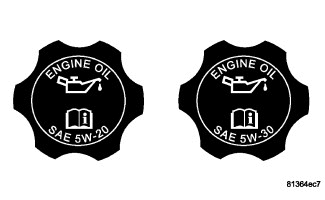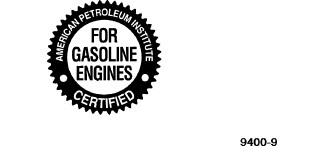

Engine oil lubricates automotive motors and is essential to proper car maintenance and performance. Read the article below to gain an understanding of choosing the right motor oil for your vehicle. Access full Chilton's content from your library to find automotive repair information by make, model, and year.
New or used engine oil can be irritating to the skin. Avoid prolonged or repeated skin contact with engine oil. Contaminants in used engine oil, caused by internal combustion, can be hazardous to your health. Thoroughly wash exposed skin with soap and water. Do not wash skin with gasoline, diesel fuel, thinner, or solvents, health problems can result. Do not pollute, dispose of used engine oil properly. Contact your dealer or government agency for location of collection center in your area.
Only lubricants bearing designations defined by the following organization should be used.
Use an engine oil that is API Certified. MOPAR® provides engine oils, that meet or exceed this requirement.

An SAE viscosity grade is used to specify the viscosity of engine oil. Use only engine oils with multiple viscosities. These are specified with a dual SAE viscosity grade which indicates the cold-to-hot temperature viscosity range. Select an engine oil that is best suited to your particular temperature range. Refer to your engine oil filler cap for the recommended engine oil viscosity for your vehicle.
For vehicles equipped with a Diesel Particulate Filter (DPF), use a fully synthetic, low ash oil that meets Chrysler Material Standard MS-11106.
For vehicles not equipped with a DPF, use a fully synthetic oil that meets Chrysler Material Standard MS-10725.
For countries that use the ACEA European Oil Categories for Service Fill Oils, use engine oils that meet the requirements of ACEA A1/B1, A2/B2, or A3/B3.
An Energy Conserving type oil is recommended for gasoline engines. The designation of ENERGY CONSERVING is located on the label of an engine oil container.

Standard engine oil identification notations have been adopted to aid in the proper selection of engine oil. The identifying notations are located on the front label of engine oil plastic bottles and the top of engine oil cans.
This symbol means that the oil has been certified by the American Petroleum Institute (API). Chrysler only recommends API Certified engine oils. Use Mopar® engine oil or equivalent.
There are a number of engine oils being promoted as either synthetic or semi-synthetic. If you chose to use such a product, use only those oils that meet the American Petroleum Institute (API) and SAE viscosity standard. Follow the service schedule that describes your driving type.
The manufacturer does not recommend the addition of any engine oil additives/supplements to the specified engine oil. Engine oil additives/supplements should not be used to enhance engine oil performance. Engine oil additives/supplements should not be used to extend engine oil change intervals. No additive is known to be safe for engine durability and can degrade emission components. Additives can contain undesirable materials that harm the long term durability of engines by: